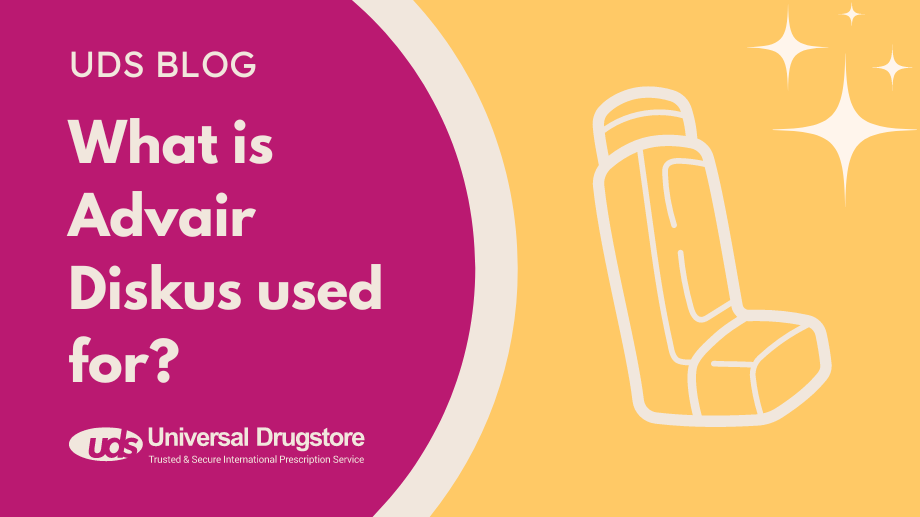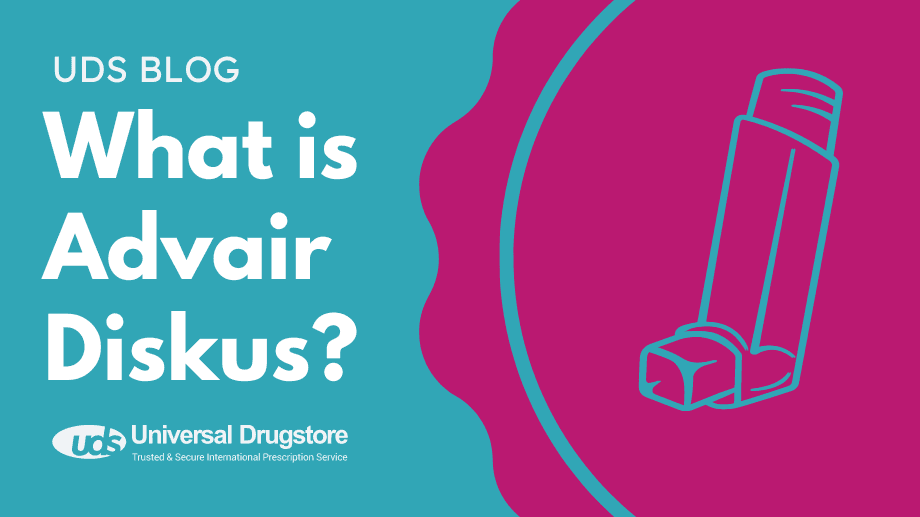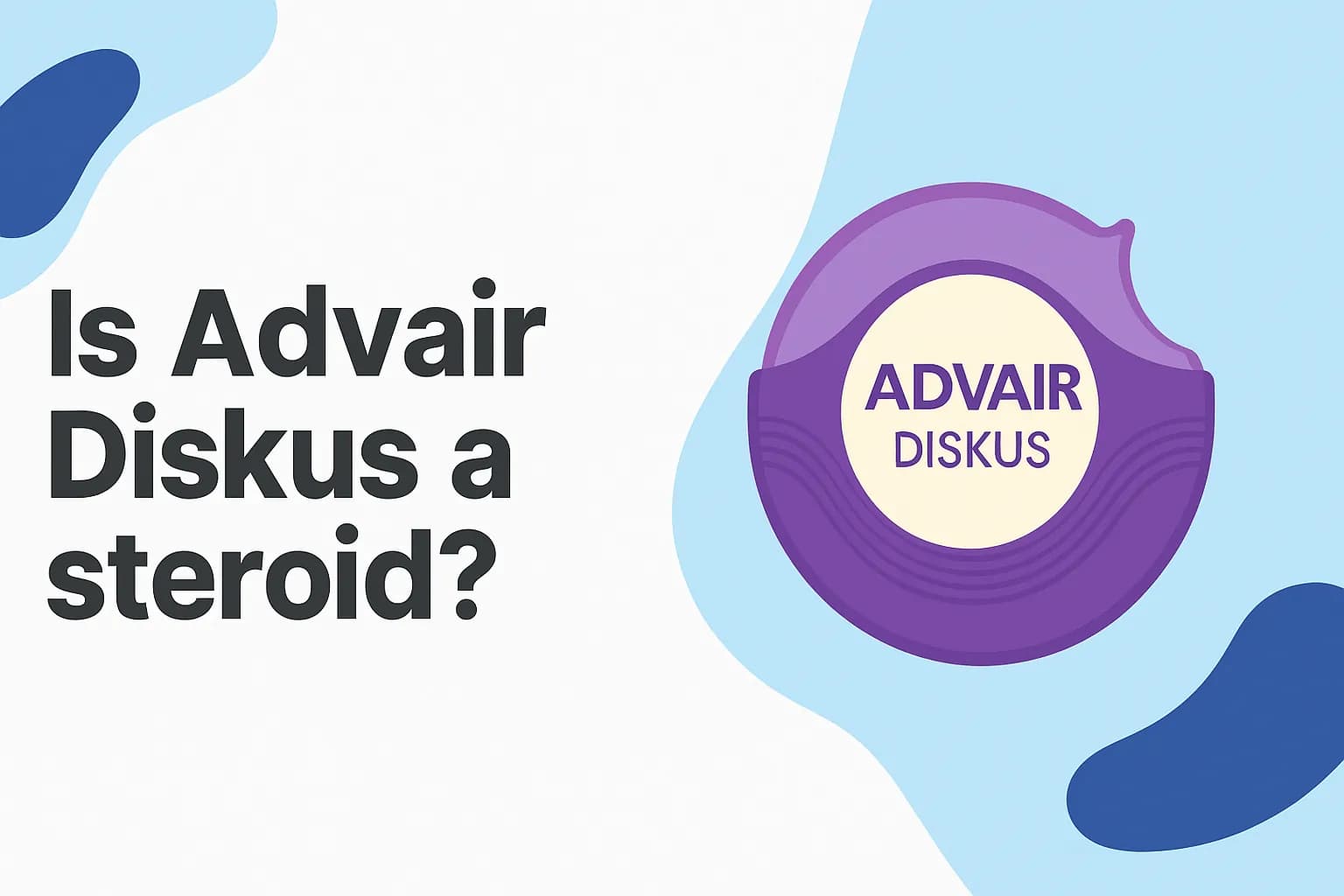What is Advair Diskus used for?

Advair Diskus is a brand-name fluticasone propionate and salmeterol inhalation powder that you breathe in deeply to get the medication into your lungs. It is a maintenance medication you need to take twice daily every day for it to be effective. Advair Diskus is FDA-approved to treat asthma and chronic obstructive pulmonary disease (COPD).
Chronic obstructive pulmonary disease (COPD)
COPD is a chronic lung disease caused by damage to your airways or other parts of your lung that blocks airflow and makes it hard for you to breathe. COPD can cause coughing that produces large amounts of mucus. It can also cause shortness of breath, wheezing, chest tightness, lack of energy, and frequent respiratory infections. COPD symptoms often develop slowly but worsen over time and can limit your ability to do routine activities. If not properly treated, COPD can prevent you from doing basic activities such as walking, cooking, or taking care of yourself. The most common types of COPD are chronic bronchitis and emphysema.
Asthma
Asthma is a chronic condition that affects the airways in your lungs which carry air in and out of your lungs. If you have asthma, these airways can become inflamed and narrowed. This makes it harder for air to flow out of your airways when you breathe out. According to the CDC, 1 in 13 Americans suffer from asthma. There are certain triggers such as pollen, viral infections, or exercise that can cause or worsen asthma symptoms. Sudden worsening of asthma symptoms is called an asthma attack. Attacks can come on fast or gradually and can be life-threatening. During an asthma attack, you can have shortness of breath and your chest may feel tight or like someone is sitting on it. You may start to wheeze and feel lightheaded. You should use your rescue inhaler as soon as you start having any symptoms of an asthma attack. If your inhaler does not relieve your symptoms or you have a severe asthma attack, you should seek immediate medical attention.
Advair Diskus is not approved to treat sudden breathing problems (asthma attacks) and will not replace your rescue inhaler (albuterol).
Advair Diskus FAQs
What does Advair do for your lungs?
Advair Diskus is an oral inhalation powder that contains the active ingredients fluticasone propionate and salmeterol.
Fluticasone propionate is an inhaled corticosteroid (ICS). It is thought to work directly in your lungs to reduce swelling and inflammation, making it easier for you to breathe.
Salmeterol is a long-acting beta-agonist (LABA). It is a bronchodilator that works by relaxing the muscles in your lungs to open up your airways, making it easier to breathe.
What dosage forms are Advair Diskus available in?
Advair Diskus is available as an inhalation powder in the following strengths:
- 100 mcg/50 mcg
- 250 mcg/50 mcg
- 500 mcg/50 mcg
How often should you take Advair Diskus?
Your healthcare provider will prescribe the strength of Advair Diskus that is right for you. It is important to follow your healthcare provider’s instructions on how to use Advair Diskus properly. The recommended dosage of Advair Diskus is 1 inhalation twice a day. It should be used around the same time every day, about 12 hours apart.
What are the side effects of Advair Diskus?
While Advair Diskus is generally well-tolerated, like any medication, it can cause side effects. The most common side effects of Advair Diskus seen in clinical trials include:
- Upper respiratory infections
- Sore throat
- Headache
- Bronchitis
- Cough
- Nausea and vomiting
- Throat irritation and hoarseness
Other side effects seen with Advair Diskus include:
- Dizziness
- Oral thrush (fungal infection that causes sores or white patches in your mouth or throat)
- Stomach pain or discomfort
- Diarrhea
- Muscle pain
While less common, some individuals may experience serious side effects while using Advair Diskus. These side effects may require immediate medical attention. If you experience any of the following, contact your healthcare provider or seek emergency medical assistance:
Serious allergic reactions, which can be life-threatening. Symptoms can include:
- Hives
- Trouble breathing
- Swelling of the mouth, throat, and tongue
Acute bronchospasm.
Medications like Advair Diskus can sometimes cause muscle spasms in your lungs which can lead to trouble breathing, wheezing, cough, and chest pain or discomfort.
If you have worsening breathing after using Advair Diskus, use your rescue inhaler and get medical attention immediately.
Increased risk of infections.
Advair Diskus contains an inhaled corticosteroid (fluticasone), which can weaken your immune system and make you more likely to get an infection.
Notify your healthcare provider right away if you develop symptoms of infections, such as fever, chills, or body aches.
Changes in your stress hormone levels.
This can happen when you stop taking an oral corticosteroid medication (prednisone) and start taking Advair Diskus.
Shop Medications
Let your healthcare provider know if you experience fatigue, nausea and vomiting, lack of energy, low blood pressure (hypotension), or weakness.
Delayed growth in children.
Children who use inhaled steroids, like Advair Diskus, might experience a delay in growth. To lower this risk, your child’s healthcare provider will use the lowest dose needed to help treat their condition. You should also check your child’s growth regularly while they’re receiving this medication.
Eye problems.
Although rare, people using Advair Diskus over a long time may have higher pressure in their eyes, cataracts, and glaucoma. Contact your healthcare provider if you notice any changes to your vision while using this medication.
Heart problems.
The long-acting beta-agonist, salmeterol, can cause high blood pressure, increased heart rate, and an irregular heartbeat.
You may need to regularly check your blood pressure and heart rate at home if you have heart problems. Do not use Advair Diskus more than prescribed. Tell your healthcare provider if you have tremors, dizziness, rapid heartbeat, fatigue, or weakness after you start this medication.
Low potassium levels.
This medication can cause the potassium levels in your blood to decrease, especially if you use more than recommended. The change in your potassium is usually mild and temporary. Let your healthcare provider know if you have any tiredness, weakness, muscle cramps, a racing heart, or a “pins and needles” feeling in your hands and feet.
Weakened bones and osteoporosis.
These are not all of the possible side effects of Advair Diskus. You should always seek medical advice from your healthcare provider for any questions or concerns about your medical condition or treatment. Read all patient information, medication guides, or drug information sheets that come with this medication. You can also report adverse effects to the FDA at www.fda.gov/medwatch or 1-800-FDA-1088.
What drug interactions are there with Advair Diskus?
Advair Diskus may interact with other medications, supplements, or foods, potentially affecting its effectiveness or increasing the risk of side effects. It is important to inform your healthcare professional about all the medications, including prescription drugs, over-the-counter medications, vitamins, and supplements you are taking, including:
- Strong CYP3A4 inhibitors such as clarithromycin, ritonavir, and ketoconazole should not be used with Advair Diskus.
- Tricyclic antidepressants (amitriptyline) and monoamine oxidase inhibitors (phenelzine) should be used with extreme caution.
- Beta-blockers (atenolol) and diuretics (furosemide) should be used with caution while on this medication.
Who should not take Advair Diskus?
Advair Diskus is contraindicated if you have a known allergy to fluticasone, salmeterol, milk proteins, or any other inactive ingredients in this product.
You should also make sure your healthcare provider is aware of your medical conditions before you start taking Advair Diskus, including:
- Heart problems such as high blood pressure or irregular heartbeat
- Seizures
- Thyroid issues
- Diabetes
- Liver issues
- Osteoporosis
- Immune system issues
- Current or history of eye problems such as cataracts, glaucoma, or increased pressure in your eye
- Any type of bacterial, fungal, or viral such as herpes or tuberculosis
- Exposure to measles or chickenpox
- Taking antifungals or medications for HIV
- Pregnant or plan on becoming pregnant; it is not known if the medications in Advair Diskus will cause harm to your unborn baby
- Are breastfeeding or plan to breastfeed; it is not known if the medications in Advair Diskus pass into breast milk and what effect they might have on your breastfed infant
What happens if I take an extra dose of Advair Diskus?
Taking one extra dose of Advair will probabley not cause serious harm. But you may experience more side effects, such as headache, sore throat or nausea. If you consistently take extra doses of Advair, you are at increased risk of serious side effects such as fast heart rate, chest pain, or tremors. If your asthma or COPD is not controlled by your current dose of Advair Diskus, notify your healthcare provider. They may need to increase your dose or change your medication.
How should you store Advair Diskus?
Store Advair Diskus at room temperature between 68°F and 77°F (20°C and 25°C). It should be kept in the unopened foil pouch and opened only when you are ready to use it. Keep it away from direct sunlight in a cool, dry place out of the reach of children. Do not wash the Diskus or mouthpiece and do not use it with a spacer device. Safely dispose of your inhaler in the trash 1 month after you open the foil pouch or when the counter reads 0, whichever comes first.
Is Advair Diskus the same as Advair HFA?
Advair Diskus is a powder form of fluticasone and salmeterol that comes with a special inhaler device pre-loaded with blister packs containing measured doses of the medicine. You have to breathe in deeply and quickly to get the medication into your lungs. Advair HFA is an aerosol form of the same medications. It comes in a canister that is used with an actuator inhaler device. Advair HFA uses a propellant to help deliver the medications.
Does Advair Diskus affect your teeth?
Yes, Advair can affect your teeth, but it is not a common side effect. In clinical studies, some people reported dental discomfort and pain while using Advair Diskus. It is not known if Advair Diskus was the cause of this side effect.
Related medications
- Advair HFA (fluticasone propionate/salmeterol)
- Flovent Diskus (fluticasone propionate)
- Dulera (mometasone/formoterol)
- Symbicort (budesonide/formoterol)
- Breo Ellipta (fluticasone furoate/vilanterol)
- Trelegy Ellipta (fluticasone furoate/umeclidinium/vilanterol)
Sources
- Medscape: https://reference.medscape.com/drug/advair-diskus-salmeterol-fluticasone-inhaled-343448
- Advair Diskus Prescribing Information: https://gskpro.com/content/dam/global/hcpportal/en_US/Prescribing_Information/Advair_Diskus/pdf/ADVAIR-DISKUS-PI-PIL-IFU.PDF
- PDR: https://www.pdr.net/drug-summary/?drugLabelId=166
- DailyMed: https://dailymed.nlm.nih.gov/dailymed/drugInfo.cfm?setid=4eeb5f6a-593f-4a9e-9692-adefa2caf8fc
- NIH: https://www.nhlbi.nih.gov/health/asthma
- NIH: https://www.nhlbi.nih.gov/health/copd




